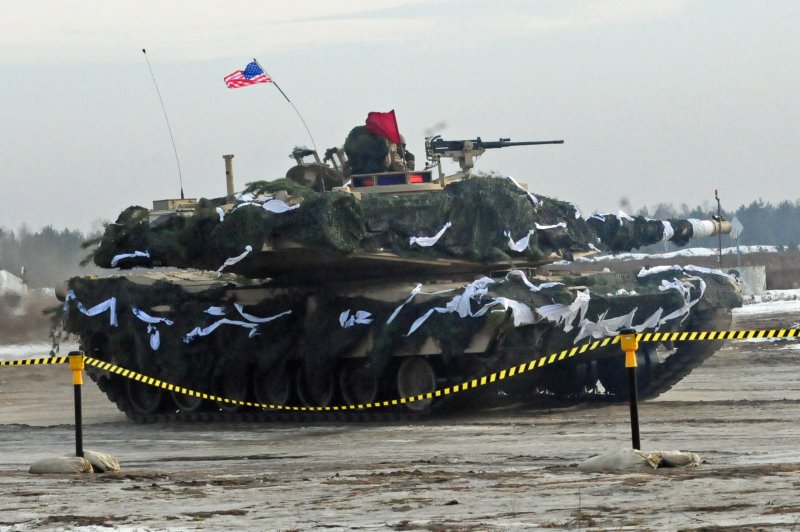An American Abrams Tank moves into firing position during a live-fire training exercise with NATO allies on January 30 at Karlikie Range, Zagan, Poland. Security expert Michael O'Hanlon said barring any further nations from joining NATO might ease tensions with Russia. File Photo by Staff Sgt. Corinna Baltos/U.S. Army/UPI
WASHINGTON -- NATO should not allow any new countries to join in an effort to ease the currently strained relationship between the 29-member state bloc and Russia, Brookings Institution senior fellow Michael O'Hanlon said Monday.
NATO, which was founded in April 1949, has been under scrutiny since the election of President Donald Trump, who delayed reaffirming U.S. support for the article in the NATO treaty that says that an attack on one member state is an attack on all. O'Hanlon hopes his proposal would help avoid needing to invoke that article.
"The main problem I'm trying to solve ... is the horrible state of U.S.-Russia relations and, to be blunt, the risk of war," he said.
Under O'Hanlon's proposal, currently neutral states in eastern Europe and western Asia would not be eligible for NATO membership to create a permanent neutral zone. According to O'Hanlon, many of these countries, including the Baltic countries and other former Soviet satellite states like Ukraine, which are in Russia's crosshairs because Moscow believes they are potential NATO members. Of course, Russia must acknowledge these countries have other options for membership in international organizations, including the European Union, he said.
"We can be flexible on NATO, we cannot be flexible on the EU," O'Hanlon said. "If [these neutral countries] want to call themselves western and be western in every other sense of the word, so be it."
But there's one problem, according to O'Hanlon's colleague and former U.S. Ambassador to the Ukraine Steve Pifer: Convincing other countries to go along with the ban on new countries.
"Many of the countries that would be in that neutral zone don't want to be there," he said. "If you establish that [neutral] zone, I believe the United States would respect it. The Russians would not."
O'Hanlon conceded that the odds are against his proposal because it would require Russian cooperation, but he hoped it might start a discussion. He emphasized this cooperation would not be based on friendship or even trust, but on a transactional relationship that lets Russian President Vladimir Putin save face with his people while warding off military conflict.
"[Putin] could say, 'I'm the guy who stopped the west,'" he said. "I don't like giving him these bragging rights ... but it's a relatively small price to pay in the end."
According to him, expanding NATO to countries like Georgia and the Ukraine could endanger the alliance by starting conflicts citizens in those member states don't want.
"We are risking Article Five's integrity by extending it to countries we are not ready to fight for," he said. "If you think about the point of view of a German citizen, ... the notion that we're going to have the equivalent of a World War I break out where some small little infraction in some small far away country leads to the mobilization of large armies that are backed up by nuclear weapons is probably pretty scary to a lot of people."















